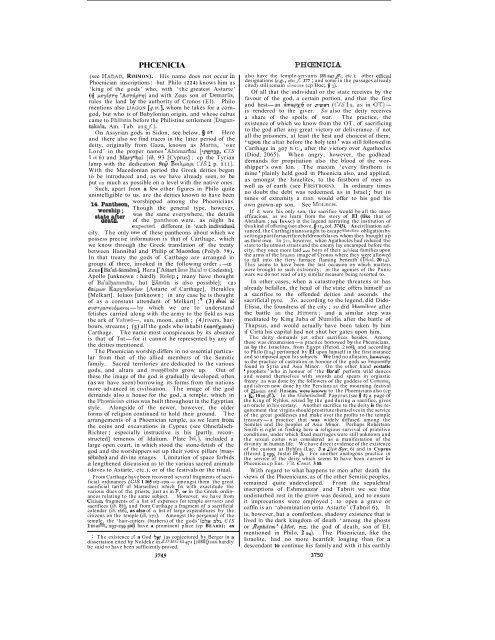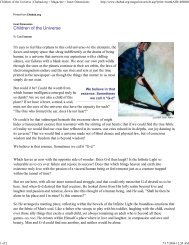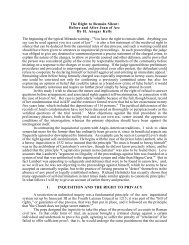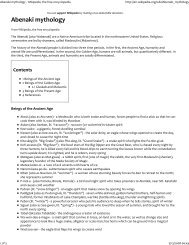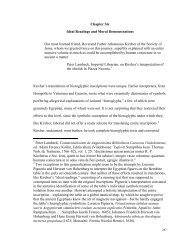Encylodaedia Biblica; a critical dictionary of the literary, political and ...
Encylodaedia Biblica; a critical dictionary of the literary, political and ...
Encylodaedia Biblica; a critical dictionary of the literary, political and ...
Create successful ePaper yourself
Turn your PDF publications into a flip-book with our unique Google optimized e-Paper software.
PHCENICIA PHCl3NICIA<br />
(see HADAD, RIMMON). His name does not occur in<br />
Phoenician inscriptions : but Philo (224) knows him as<br />
‘king <strong>of</strong> <strong>the</strong> gods’ who, with ‘<strong>the</strong> greatest Astarte’<br />
(4 peylurq ’Aurdprq) <strong>and</strong> with Zeus son <strong>of</strong> Demarus,<br />
rules <strong>the</strong> l<strong>and</strong> by <strong>the</strong> authority <strong>of</strong> Cronos (El). Philo<br />
mentions also DAGON [q...], whom he takes for a corngod,<br />
but who is <strong>of</strong> Babylonian origin, <strong>and</strong> whose cultus<br />
came to Philistis before <strong>the</strong> Philistine settlement (Dagantakala,<br />
Am. Tab. 215f:).<br />
On Assyrian gods in Sidon, see below, fj 21. Here<br />
<strong>and</strong> <strong>the</strong>re also we find traces in <strong>the</strong> later period <strong>of</strong> <strong>the</strong><br />
deity, originally from Gaza, known as hlarna, ‘our<br />
Lord’ in <strong>the</strong> proper names ‘Abdmarfiai (‘jmmy, CZS<br />
116 6) <strong>and</strong> MarThai (i6. 93 [Cyprus] ; cp <strong>the</strong> Tyrian<br />
lamp with <strong>the</strong> dedication 6’eG BseXpapr CZS1 p. 111).<br />
With <strong>the</strong> Macedonian period <strong>the</strong> Greek deities began<br />
to be introduced <strong>and</strong>, as we have already seen, to be<br />
put as much as possible on a level with <strong>the</strong> native ones.<br />
Such, apart from a few o<strong>the</strong>r figures in Philo quite<br />
unintelligible - to us. are <strong>the</strong> deities known to have been<br />
worshipped among <strong>the</strong> Phoenicians.<br />
142tt;y Though <strong>the</strong> general type, however,<br />
state after was <strong>the</strong> same everywhere, <strong>the</strong> details<br />
.. <strong>of</strong> <strong>the</strong> Dan<strong>the</strong>on were. as niieht he<br />
aeatn* exoected. different in ‘each inchdual<br />
city. The only one <strong>of</strong> <strong>the</strong>se pan<strong>the</strong>ons about which we<br />
possess precise information is that <strong>of</strong> Carthage, which<br />
we know through <strong>the</strong> Greek translation <strong>of</strong> <strong>the</strong> treaty<br />
between Hannibal <strong>and</strong> Philip <strong>of</strong> Macedon (Polyb. 79).<br />
In that treaty <strong>the</strong> gods <strong>of</strong> Carthage are arranged in<br />
groups <strong>of</strong> three, invoked in <strong>the</strong> following order :-(I)<br />
Zeus [Ba‘al-Sami%n], Hera [‘AHtart Sme Ba‘al= Coelestis],<br />
Apollo [unknown : hardly ReSep ; many have thought<br />
<strong>of</strong> Ba‘alhammh, hut ESmtin is also possible]; (2)<br />
Gaipwv KapXqGoviwv [Astarte <strong>of</strong> Carthage], Herakles<br />
[Melkart]. Iolaos [unknown ; in any case he is thought<br />
<strong>of</strong> as a constant attendant <strong>of</strong> Melkart] ; (3) @so2 oi<br />
uuurpareubpwor-by which we are to underst<strong>and</strong><br />
fetishes carried along with <strong>the</strong> army to <strong>the</strong> field as was<br />
<strong>the</strong> ark <strong>of</strong> Yahwk--, sun, moon, earth ; (4) rivers, harbours,<br />
streams ; (5) all <strong>the</strong> gods who inhabit (KadXouur)<br />
Carthage. The name most conspicuous by its absence<br />
is that <strong>of</strong> Tnt-for it cannot be represented by any <strong>of</strong><br />
<strong>the</strong> deities mentioned.<br />
The Phoenician worship differs in no essential particular<br />
from that <strong>of</strong> <strong>the</strong> allied members <strong>of</strong> <strong>the</strong> Semitic<br />
family. Sacred territories are dedicated to <strong>the</strong> various<br />
gods, <strong>and</strong> altars <strong>and</strong> niassebahs grow up. Out <strong>of</strong><br />
<strong>the</strong>se <strong>the</strong> image <strong>of</strong> <strong>the</strong> god is gradually developed, <strong>of</strong>ten<br />
(as we have seen) borrowing its forms from <strong>the</strong> nations<br />
more advanced in civilisation. The image <strong>of</strong> <strong>the</strong> god<br />
dem<strong>and</strong>s also a house for <strong>the</strong> god, a temple, which in<br />
<strong>the</strong> Phmnician cities was built throughout in <strong>the</strong> Egyptian<br />
style. Alongside <strong>of</strong> <strong>the</strong> newer, however, <strong>the</strong> older<br />
forms <strong>of</strong> religion continued to hold <strong>the</strong>ir ground. The<br />
arrangements <strong>of</strong> a Phoenician temple, as we learn from<br />
<strong>the</strong> coins <strong>and</strong> excavations in Cyprus (see Ohnefalsch-<br />
Richter ; especially instructive is his [partly reconstructed]<br />
temenos <strong>of</strong> Idalium. Plate lvi.), included a<br />
large open court, in which stood <strong>the</strong> stone-fetish <strong>of</strong> <strong>the</strong><br />
god <strong>and</strong> <strong>the</strong> worshippers set up <strong>the</strong>ir votive pillars (mas-<br />
SEbahs) <strong>and</strong> divine images. Limitation <strong>of</strong> space forbids<br />
a leng<strong>the</strong>ned discussion as to <strong>the</strong> various sacred animals<br />
(doves to Astarte, etc.), or <strong>of</strong> <strong>the</strong> festivals or <strong>the</strong> ritual.<br />
From Carthage have been recovered several fragments <strong>of</strong> sacrificial<br />
ordinances (CIS 1 165 167.170 -amongst <strong>the</strong>m <strong>the</strong> great<br />
sacrificial tariff <strong>of</strong> Marseilles) which fix with exactitude <strong>the</strong><br />
various dues <strong>of</strong> <strong>the</strong> priests, just as in P, or in <strong>the</strong> Greek ordinances<br />
relating to <strong>the</strong> same subject. Moreover, we have from<br />
Cilium fragments <strong>of</strong> a list <strong>of</strong> expenses for temple servants <strong>and</strong><br />
sacrifices (i6. 86), <strong>and</strong> from Carthage a fragment <strong>of</strong> a sacrificial<br />
calendar (i6.166), as also <strong>of</strong> a list <strong>of</strong> large expenditures by <strong>the</strong><br />
citizens on <strong>the</strong> temple (3. 171). Amongst <strong>the</strong> personnel <strong>of</strong> <strong>the</strong><br />
temple, <strong>the</strong> ‘ hair-cutters (barbers) <strong>of</strong> <strong>the</strong> gods’ (&K 152, CIS<br />
186aPJ, 257-259588) have a prominent place (cp BEARD); as<br />
1 The existence <strong>of</strong> a God 5” (as conjectured by Berger in a<br />
dissertation cited by Noldeke in ZDhfG42 471 [1888])can hardly<br />
be said to have been sufficiently proved.<br />
3749<br />
also have <strong>the</strong> temple-servants (86247&, etc.); o<strong>the</strong>r <strong>of</strong>iicial<br />
designations (e.c., 260J 377 ; <strong>and</strong> some in <strong>the</strong> passages already<br />
cited) still remain ohscure (cp Doc;, $ 3).<br />
Of all that <strong>the</strong> individual or <strong>the</strong> state receives by <strong>the</strong><br />
favour <strong>of</strong> <strong>the</strong> god, a certain portion, <strong>and</strong> that <strong>the</strong> first<br />
<strong>and</strong> hest-an (irrapxf or nvmi (CZS15, as in 0T)-<br />
is rendered to <strong>the</strong> giver. So also <strong>the</strong> deity receives<br />
a share <strong>of</strong> <strong>the</strong> spoils <strong>of</strong> war. The practice, <strong>the</strong><br />
existence <strong>of</strong> which we know from <strong>the</strong> OT, <strong>of</strong> sacrificing<br />
to <strong>the</strong> god after any great victory or deliverance. if not<br />
all <strong>the</strong> prisoners, at least <strong>the</strong> best <strong>and</strong> choicest <strong>of</strong> <strong>the</strong>m,<br />
*upon <strong>the</strong> altar before <strong>the</strong> holy tent ’ was still followed in<br />
Carthage in 307 R. c., after <strong>the</strong> victory over Agathocles<br />
(Diod. 2065). When angry, however, <strong>the</strong> godhead<br />
dem<strong>and</strong>s for propitiation also <strong>the</strong> blood <strong>of</strong> <strong>the</strong> wor-<br />
shipper’s own kin. The maxim ‘every firstborn is<br />
mine ’ plainly held good in Phoenicia also, <strong>and</strong> applied,<br />
as amongst <strong>the</strong> Israelites, to <strong>the</strong> firstborn <strong>of</strong> men as<br />
well as <strong>of</strong> earth (see FIRSTBORN). In ordinary times<br />
no doubt <strong>the</strong> debt was redeemed, as in Israel ; but in<br />
times <strong>of</strong> extremity a man would <strong>of</strong>fer to his god his<br />
own grown-up son. See MOLECH.<br />
If it were his only son, <strong>the</strong> sacrifice would be all <strong>the</strong> more<br />
efficacious, as we learn from <strong>the</strong> story <strong>of</strong> El (like that <strong>of</strong><br />
Abraham ; see ISAAC) in <strong>the</strong> legend narrating <strong>the</strong> institution <strong>of</strong><br />
this kind <strong>of</strong><strong>of</strong>fering(see above, $11, col. 3743). As civilisation ad-<br />
vanced, <strong>the</strong> Carthaginians sought to escape <strong>the</strong>dire obligation by<br />
settingapart forsacrificechildren<strong>of</strong>slaves whom <strong>the</strong>y brought up<br />
as <strong>the</strong>ir own. In 310, however, when Agathocles had reduced <strong>the</strong><br />
state to <strong>the</strong> utmost straits <strong>and</strong> <strong>the</strong> enemy lay encamped before <strong>the</strong><br />
city, <strong>the</strong>y once more laid 200 boys <strong>of</strong> <strong>the</strong>ir nohlest families upon<br />
<strong>the</strong> arms <strong>of</strong> <strong>the</strong> brazen image <strong>of</strong> Cronos where <strong>the</strong>y were allowed<br />
to fall into <strong>the</strong> fiery furnace flaming beneath (Diud. 20 14).<br />
This seems to have been <strong>the</strong> last occasion on which matters<br />
were brought to such extremity; in <strong>the</strong> agonies <strong>of</strong> <strong>the</strong> Punic<br />
wars we do not read <strong>of</strong> any similar measure being resorted to.<br />
In o<strong>the</strong>r cases, when a catastrophe threatens or has<br />
already befallen, <strong>the</strong> head <strong>of</strong> <strong>the</strong> state <strong>of</strong>fers himself as<br />
a sacrifice to <strong>the</strong> <strong>of</strong>fended deities <strong>and</strong> ascends <strong>the</strong><br />
sacrificial pyre. So, according to <strong>the</strong> legend, did Dido-<br />
Elissa, <strong>the</strong> foundress <strong>of</strong> <strong>the</strong> city ; so did Hamilcar after<br />
<strong>the</strong> battle on <strong>the</strong> Himera; <strong>and</strong> a similar step was<br />
meditated by King Juba <strong>of</strong> Numidia after <strong>the</strong> battle <strong>of</strong><br />
Thapsus, <strong>and</strong> would actually have been taken by him<br />
if Cirta his capital had not shut her gates upon him.<br />
The deity dem<strong>and</strong>s yet o<strong>the</strong>r sacrifices besides. Among<br />
<strong>the</strong>se was circumcision-a practice borrowed by <strong>the</strong> Phcenicians,<br />
as by <strong>the</strong> Israelites, from Egypt (Herod. 2 108), <strong>and</strong> according<br />
to Philo (224) performed by El upon himself in <strong>the</strong> first instance<br />
<strong>and</strong> so imposed upon his subjects. We find no allusion, however<br />
to <strong>the</strong> practice <strong>of</strong> castration in honour <strong>of</strong> <strong>the</strong> gods so frequentl;<br />
found in Syria <strong>and</strong> Asia Minor. On <strong>the</strong> o<strong>the</strong>r h<strong>and</strong> ecstatic<br />
L prophets ’ who in honour <strong>of</strong> ‘<strong>the</strong> Ba‘al ’ perform wild dances<br />
<strong>and</strong> wound <strong>the</strong>mselves with swords <strong>and</strong> spears in orgiastic<br />
frenzy as was done by <strong>the</strong> followers <strong>of</strong> <strong>the</strong> goddess <strong>of</strong> Comma,<br />
<strong>and</strong> ishven now done by <strong>the</strong> Persians at <strong>the</strong> mourning festival<br />
<strong>of</strong> Hasan <strong>and</strong> Husein were known to <strong>the</strong> Phoenicians also (cp<br />
I K: 18 26fi). In <strong>the</strong>’Golenischeff Papyrus (see B 5) a page <strong>of</strong><br />
<strong>the</strong> King <strong>of</strong> Ryhlos, seized by <strong>the</strong> god during a sacrifice, gives<br />
an oracle in his ecstasy. Ano<strong>the</strong>r sacrifice to <strong>the</strong> deity is <strong>the</strong> re-<br />
quirement that virgins should prostitute <strong>the</strong>mselves in <strong>the</strong> service<br />
<strong>of</strong> <strong>the</strong> great goddesses <strong>and</strong> make over <strong>the</strong> pr<strong>of</strong>its to <strong>the</strong> temple<br />
treasury-a practice that was widely diffused among <strong>the</strong><br />
Semites <strong>and</strong> <strong>the</strong> peoples <strong>of</strong> Asia Minor. Perhaps Rohertson<br />
Smith is right in finding here a religious survival <strong>of</strong> primitive<br />
conditions, under which fixed marriages were still unknown <strong>and</strong><br />
<strong>the</strong> sexual coitus was considered as a manifestation <strong>of</strong> <strong>the</strong><br />
divinity in human life. We have direct evidence <strong>of</strong> <strong>the</strong> existence<br />
<strong>of</strong> <strong>the</strong> custom at Byhlos (Luc. De Dea Syr. 6) <strong>and</strong> in Cyprus<br />
(Herod. 1 199, Justin 18 5). For ano<strong>the</strong>r analogous practice in<br />
<strong>the</strong> service <strong>of</strong> <strong>the</strong> deity which seems to have been current in<br />
Phcenicia cp Eus. Vit. Const. 3 55.<br />
With regard to what happens to men after death <strong>the</strong><br />
views <strong>of</strong> <strong>the</strong> Phoenicians, as <strong>of</strong> <strong>the</strong> o<strong>the</strong>r Semitic peoples,<br />
remained quite undeveloped. From <strong>the</strong> sepulchral<br />
inscriptions <strong>of</strong> Eshmunazar <strong>and</strong> Tabnit we see that<br />
undisturbed rest in <strong>the</strong> grave was desired, <strong>and</strong> to ensure<br />
it imprecations were employed ; to open a grave or<br />
c<strong>of</strong>fin is an ‘abomination unto Astarte’ (Tabnit 6). It<br />
is, however, hut a comfortless, shadowy existence that is<br />
lived in <strong>the</strong> dark kingdom <strong>of</strong> death ‘ among <strong>the</strong> ghosts<br />
or Rephiinz’ (A40ot. nn. <strong>the</strong> god <strong>of</strong> death, son <strong>of</strong> El,<br />
mentioned in Philo, 2 24). The Phoenician, like <strong>the</strong><br />
Israelite, had no more heartfelt longing than for a<br />
descendant to continue his family <strong>and</strong> with it his earthly<br />
3750


